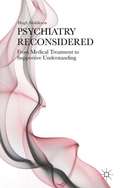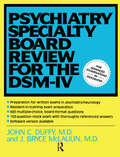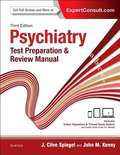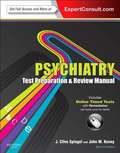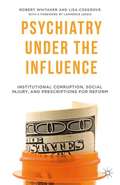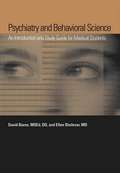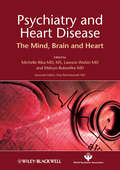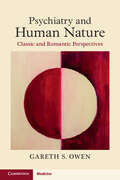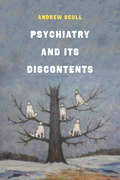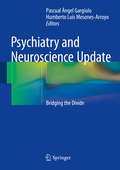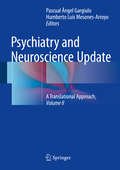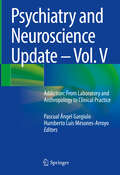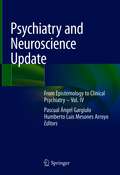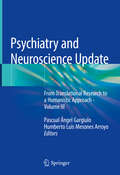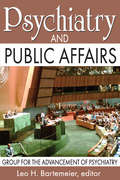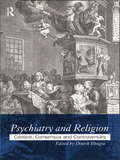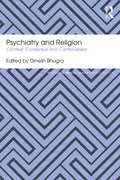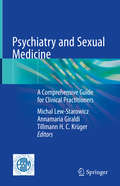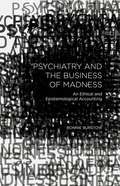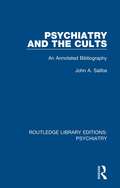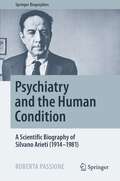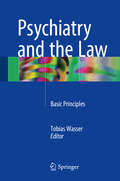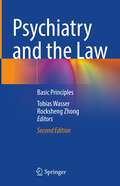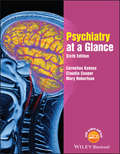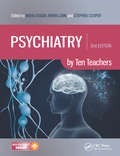- Table View
- List View
Psychiatry Reconsidered
by Hugh MiddletonPsychiatry suffers a lot of criticism, not least from within its own scientifically founded medical world. This book provides an account of mental health difficulties and how they are generally addressed in conventional medical circles, alongside critical reviews of the assumptions underpinning them to encourage more humanitarian perspectives.
Psychiatry Specialty Board Review For The DSM-IV (Continuing Education in Psychiatry and Psychology Series #5)
by John Duffy J. Bryce McLaulinFirst published in 1996. Routledge is an imprint of Taylor & Francis, an informa company.
Psychiatry Test Preparation And Review Manual
by J. Clive Spiegel John M. KennyCovering every area of the ABPN board exam, the 3rd Edition of Psychiatry Test Preparation and Review Manual, by Drs. J. Clive Spiegel and John M. Kenny, includes 1,100 questions, video vignettes, and an online timed assessment to prepare you for certification or recertification success. You'll know exactly what to expect when exam day arrives, thanks to current coverage of the latest research in both psychiatry and neurology, as well as a format that precisely mimics all aspects of the written exam. Features six tests of 150 multiple-choice questions each, as well as 160 multiple-choice questions related to case vignettes. Allows you to see results broken down by topic online, so you can target areas needing further study. Bookmarking and score archiving are also available online. Allows you to exclude topics which are not included on the MOC, such as neuroscience and neurology, so you can more narrowly focus your study. Gives clear explanations for both insufficient/incorrect and correct answers, and provides recommended readings from key textbooks. Reflects the latest research and clinical practice in both psychiatry and neurology.
Psychiatry Test Preparation and Review Manual (Second Edition)
by J. Clive Spiegel John M. KennyUpdated to reflect all of the latest research in psychology and neurology, Psychiatry Test Preparation and Review Manual, 2nd Edition precisely mirrors the written ABPN board exam so you can expertly prepare and achieve your highest score. This psychiatry Q book now features over one thousand questions including an online component with all MCQs from the text, ensuring you know exactly what to expect when exam day arrives. Enhance your preparation with recommended readings from key textbooks in the field. Understand why your answers are correct or incorrect through detailed explanations of each possible response. Study as effectively as possible with 300 brand-new questions that match the current exam format, as well as 160 clinical vignette questions that are stylistically based on those appearing on the ABPN board exam and other standardized tests. Experience a realistic exam simulation online at www. expertconsult. com, where you can take timed assessment tests as well as untimed practice tests, target specific areas of weakness, exclude topics not included on the MOC exam (such as child psychiatry and neurology), and more!
Psychiatry Under the Influence
by Robert Whitaker Lisa CosgrovePsychiatry Under the Influence investigates how the influence of pharmaceutical money and guild interests has corrupted the behavior of the American Psychiatric Association and academic psychiatry during the past 35 years. The book documents how the psychiatric establishment regularly misled the American public about what was known about the biology of mental disorders, the validity of psychiatric diagnoses, and the safety and efficacy of its drugs. It also looks at how these two corruptinginfluences encouraged the expansion of diagnostic boundaries and the creation of biased clinical practice guidelines. This corruption has led to significant social injury, and in particular, a societal lack of informed consent regarding the use of psychiatric drugs, and the pathologizing of normal behaviors in children and adults. The authors argues that reforming psychiatry will require the neutralization of these two corrupting influences—pharmaceutical money and guild interests—and the establishment of multidisciplinary authority over the field of mental health.
Psychiatry and Behavioral Science: An Introduction and Study Guide for Medical Students
by David Baron Ellen H. SholevarThis easy-to-read, unique format text combines introductory psychiatry content with board-style review questions written for first and second year medical students. The book is intended to be used as the required text for pre-clinical psychiatric education. The user-friendly split page format includes clinical vignettes, "fun facts," and relevant art work. Each chapter contains board review questions that prepare the medical student for USMLE Step 1 and COMLEX 1. By using a clinical approach consistent with the needs of today's medical students, the authors hope to prepare first and second year medical students for their exams and clinical rotations.
Psychiatry and Heart Disease
by Michelle Riba Lawson Wulsin Divy Ravindranath Melvyn RubenfireThis unique book will help psychiatrists to understand better the risks of cardiovascular illness and cardiologists to appreciate possible pathophysiological links with psychiatric conditions. It describes the common psychiatric conditions, their key features and how they may influence cardiovascular disease, outcomes, and quality of life. It also considers the cardiovascular complications that may arise as a result of mental illness. In an exciting, collaborative approach, psychiatrists and cardiologists combine their expertise throughout the book to provide guidance on the best way to manage such patients, considering the patient as a whole, not the individual conditions.
Psychiatry and Human Nature: Classic and Romantic Perspectives
by Gareth S. OwenPsychiatry is medicine's most multi-disciplinary specialty and arguably its most intellectually and emotionally demanding. It has long attracted dual interpretations from cool, detached perspectives valuing objectivity (classic) to hotter, embodied and more political perspectives valuing subjectivity (romantic). Professor Owen argues that psychiatry should become more aware of classic and romantic threads that run through it. He approaches core topics in psychiatry and throughout the book both research and case material are used to animate the concepts. The author relates psychiatry to questions in philosophical anthropology and ethics. He presents human nature, mental disorder, and human freedom as inherently inter-related. This is a book of broad appeal to anyone interested in psychiatry and why this branch of medicine has ethical, legal and political significance.
Psychiatry and Its Discontents
by Andrew ScullWritten by one of the world’s most distinguished historians of psychiatry, Psychiatry and Its Discontents provides a wide-ranging and critical perspective on the profession that dominates the treatment of mental illness. Andrew Scull traces the rise of the field, the midcentury hegemony of psychoanalytic methods, and the paradigm’s decline with the ascendance of biological and pharmaceutical approaches to mental illness. The book’s historical sweep is broad, ranging from the age of the asylum to the rise of psychopharmacology and the dubious triumphs of “community care.” The essays in Psychiatry and Its Discontents provide a vivid and compelling portrait of the recurring crises of legitimacy experienced by “mad-doctors,” as psychiatrists were once called, and illustrates the impact of psychiatry’s ideas and interventions on the lives of those afflicted with mental illness.
Psychiatry and Neuroscience Update
by Pascual Ángel Gargiulo Humberto Luis Mesones ArroyoThe intention of this unique title is to bridge the gap between psychiatry and neuroscience, allowing a fruitful dialogue between both sciences. Recognizing that psychiatry has received important contributions from the basic neurosciences and that the basic neurosciences have received inspiration and objectives from the open problems of psychiatry, Psychiatry and Neuroscience: Bridging the Divide is designed to identify the borders, trends and implications in both fields today. Comprehensive and developed by a renowned group of experts from both fields, the book is divided into four parts: Epistemological Considerations About the Study of Normal and Abnormal Human Behaviors; From Basic Neurosciences to Human Brain; Neurosciences, Learning, Teaching and the Role of Social Environment and Explaining Human Pathological Behaviors: From Brain Disorders to Psychopathology. A unique and invaluable addition to the literature in psychiatry and neuroscience, Psychiatry and Neuroscience: Bridging the Divide offers an important and clearer understanding of the relationship between psychiatry and neuroscience.
Psychiatry and Neuroscience Update - Vol. II
by Pascual Ángel Gargiulo Humberto Luis Mesones-ArroyoThe aim of this unique book is to provide an overview of recent advances bridging the gap between psychiatry and neuroscience, allowing a fruitful dialogue between both sciences. The emerging interactions and mutual contributions between neuroscience and psychiatry are here recognized. This book is designed to identify the borders, trends and implications in both fields today. Comprehensive and developed by a renowned group of experts from both fields, the book is divided into four parts: Epistemological Considerations About the Study of Normal and Abnormal Human Behaviors; From Basic Neurosciences to Human Brain; Neurosciences, Learning, Teaching and the Role of Social Environment; and Explaining Human Pathological Behaviors: From Brain Disorders to Psychopathology. A unique and invaluable addition to the literature in psychiatry and neuroscience, Psychiatry and Neuroscience Update - Vol. II: A Translational Approach offers an important and clearer understanding of the relationship between these two disciplines. This book is directed to students, professionals and researchers of medicine, psychology, psychopedagogy and nursery.
Psychiatry and Neuroscience Update – Vol. V: Addiction: From Laboratory and Anthropology to Clinical Practice
by Pascual Ángel Gargiulo Humberto Luis Mesones-ArroyoThis book offers a multidisciplinary approach to the phenomenon of addiction, including a discussion of its anthropological, neurological, psychiatric and social aspects. The editors have maintained this multidisciplinary criterion since the first volume of the Psychiatry and Neuroscience Update collection. Approaching a topic from multiple points of view guides the mentality to open to biological and psychological relationships and facilitates translational extrapolations. The ability to establish relationships, closer or more distant, but always binding, is thus stimulated, whether for study, research or the interpretation of clinical reality. As in previous volumes, the book opens with a part dedicated to anthropological and philosophical aspects, thus ensuring the validity of the humanistic aspect. Intersubjectivity, epistemological reflections, the meaning of ecstasy, and philosophical reflection leading to therapy are explored. Part 2—From Basic Neurosciences to Human Brain—presents a set of basic investigations with high translational content. This corresponds with the editors’ intention to build bridges, here between the basic and the clinical, favoring the translational. Chapters present topics of interest to both fields, such as the neurobiology of addictions, cocaine, and benzodiazepines. Part 3 establishes links between neurosciences, learning, teaching, and the social environment. It begins with a chapter on executive functioning before discussing excessive use of computer technology and educational interventions for patients with alcohol addiction. The fourth part of the book attempts to explain pathological human behavior. It is about establishing links between brain disorders and diseases in the strict sense. Among other topics, chapters deal with cognitive dysfunction in addiction, neuroimaging, and stigma around substance use disorders. Psychiatry and Neuroscience Update: Addiction: From Laboratory and Anthropology to Clinical Practice – Vol. V was edited and authored by a multidisciplinary group of authors and will be vital for an equally multidisciplinary group of readers: psychiatrists, psychologists, neuroscientists, and any other clinician or researcher that is interested in addictions. Those in the humanities, particularly anthropologists and philosophers, will find the first part of great interest.
Psychiatry and Neuroscience Update: From Epistemology to Clinical Psychiatry – Vol. IV
by Pascual Ángel Gargiulo Humberto Luis Mesones ArroyoThis broad and thought-provoking volume provides an overview of recent intellectual and scientific advances that intersect psychiatry and neuroscience, offering a wide range of penetrating insights in both disciplines. The fourth volume on the topic in the last several years from a varying panel of international experts identifies the borders, trends and implications in both fields today and goes beyond that into related disciplines to seek out connections and influences. Similar to its three Update book predecessors, Psychiatry and Neuroscience – Volume IV presents a range of interesting topics in the main disciplines – psychiatry and neuroscience – and attempts to provide deeper comprehension or explication of the normal and diseased human mind, its biological correlates and its biographical and existential implications. This engaging volume continues the previous style of exploring different disciplines and trying to integrate disciplinary evidence from varying points of view in an organic manner. The first section is about epistemological considerations regarding the study of normal and abnormal human behaviors, including, for example, the topic of phenomenological psychopathology and phenomenological psychiatry in relation to schizophrenia and substance misuse, among other topics. Section 2 addresses issues around the translation of basic neuroscience to expression in the human brain and behavioral implications. Section 3 discusses the issues of learning, teaching and the role of social environment in the field of neuroscience. Finally section 4 reviews various perspectives on explaining human pathological behaviors -- from brain disorders to psychopathology.
Psychiatry and Neuroscience Update: From Translational Research to a Humanistic Approach - Volume III
by Pascual Ángel Gargiulo Humberto Luis Mesones ArroyoThis broad and thought-provoking volume provides an overview of recent intellectual and scientific advances that bridge the gap between psychiatry and neuroscience, offering a wide range of penetrating insights in both disciplines. The third volume on the topic in the last several years from a varying panel of international experts, this title identifies the borders, trends and implications in both fields today and goes beyond that into related disciplines to seek out connections and influences. Similar to its two Update book predecessors, Psychiatry and Neuroscience – Volume III presents the current state-of-the-art in the main disciplines – psychiatry and neuroscience – and attempts to provide deeper comprehension or explication of the normal and diseased human mind, its biological correlates and its biographical and existential implications. This engaging volume continues the previous style of exploring different disciplines and trying to integrate disciplinary evidence from varying points of view in an organic manner. Developed for clinicians and researchers in the fields of medicine, psychiatry, psychology and biology, this third volume also will be of great interest to students and university professors of diverse disciplines.
Psychiatry and Public Affairs: Group for the Advancement of Psychiatry
by Leo H. BartemeierThis stimulating collection bears witness to the insight that psychiatrists, with their special training and background and concern for human relationships, can contribute solutions to major problems of public affairs and public policy. The contributors represent the summation and distillation of the best thinking of psychiatry's leaders. They represent a variety of experiences and viewpoints, making possible a many-faceted approach to problems of national and international concern.Based on completely documented reports of individual members and symposium discussions, Psychiatry and Public Affairs examines four major areas of public interest: the social responsibility of psychiatry, emphasizing the psychiatric aspects of school desegregation; psychiatry's role in international relations and understanding cross-cultural communication and working abroad; studies of forceful indoctrination or "brainwashing" and the social and psychiatric implications of the threat of nuclear war.Contributors and contributions included here are "Physical and Social Isolation," Jack Vernon; "Psychiatric Aspects of Chinese Thought Reform," Robert J. Lifton; "Patterns of Reactions to Severe Chronic Stress in American Army POWs to the Chinese," Edgar H. Schein; "The Coming Struggle for More Responsibility," Pare Lorentz; "Some Implications of the Fall-Out Problem," Maurice B. Visscher; "Psychological Aspects of the Nuclear Arms Race," Franklin C. McLean; "Solitary Confinement," Milton Meltzer; and "Sleep Deprivation," David Tyler. Psychiatry and Public Affairs explores ideas and problems on the advancing edge of psychiatry.The Group for the Advancement of Psychiatry (GAP) envisages a continuing program of work according to the following aims: to collect and appraise significant data in the field of psychiatry, mental health, and human relations; to re-evaluate old concepts and to develop and test new ones; and to apply the knowledge thus obtained fo
Psychiatry and Religion: Context, Consensus and Controversies (Routledge Mental Health Classic Editions Ser.)
by Dinesh BhugraThe argument of this book is that the divide between psychiatry and religion is an artificial one and that there is much room for understanding the same phenomena from different perspectives. In it thirteen senior mental health professionals and pastoral workers come together to explore what their different philosophies have to offer each other for the benefit of the individuals in their care. The book as a whole: * sets the relationship between psychiatry and religion in historical context * provides detailed information about specific religions and the significance of their belief systems for mental health management * examines the relationship between psychopathology, psychiatry and religion.
Psychiatry and Religion: Context, Consensus and Controversies (Routledge Mental Health Classic Editions)
by Dinesh BhugraPsychiatry and Religion: Context, Consensus and Controversies works to eradicate the distinction between spiritual and psychological welfare and promote greater understanding of the relationship between the two. This book brings together chapters from fifteen mental health practitioners and pastoral workers to explore what their different philosophies have to offer the individuals in their care. As well as all the major world religions, the text also provides detailed information about newer religions and the significance of their belief systems for mental health management. The book examines the positive and negative effects that strict moral codes and religious rituals can produce and shows how awareness of these effects is crucial to the treatment of these patients. This classic edition of Psychiatry and Religion, with a new introduction from Dinesh Bhugra, will continue to provide an important resource to practicing and training psychiatrists.
Psychiatry and Sexual Medicine: A Comprehensive Guide for Clinical Practitioners
by Annamaria Giraldi Michal Lew-Starowicz Tillmann H. C. KrügerPsychiatry meets sexual medicine! This book explores the links between mental and sexual health and provides guidance for the treatment of the most common sexual problems. The book fills the need of many clinicians and trainees who work in the field of psychiatry and sexual medicine. Offering comprehensive and clearly structured information, case presentations, and key messages this book focuses on sharing essential knowledge and skills of recognized experts in the field. Get inspired by the vivid interactions of psychiatry and sexual medicine and help your patients on their way to improved sexual health!
Psychiatry and the Business of Madness
by Bonnie BurstowPsychiatry and the Business of Madness deconstructs psychiatric discourse and practice, exposes the self-interest at the core of the psychiatric/psychopharmacological enterprise, and demonstrates that psychiatry is epistemologically and ethically irredeemable. Burstow's medical and historical research and in-depth interviews demonstrate that the paradigm is untenable, that psychiatry is pseudo-medicine, that the "treatments" do not "correct" disorders but cause them. Burstow fundamentally challenges our right to incarcerate or otherwise subdue those we find distressing. She invites the reader to rethink how society addresses these problems, and gives concrete suggestions for societal transformation, with "services" grounded in the community. A compelling piece of scholarship, impeccable in its logic, unwavering in its moral commitment, and revolutionary in its implications.
Psychiatry and the Cults: An Annotated Bibliography (Routledge Library Editions: Psychiatry #20)
by John A. SalibaOriginally published in 1987, this title was compiled in response to the concern, in some segments of society, about the presence of new religious movements in the West in the second half of the twentieth century. There are lots of psychological questions surrounding cults and the influence they have over their members. These questions have been operative in the accumulation of this annotated bibliography, which was intended primarily as a reference guide for psychiatrists and counsellors who advise cult members, ex-cult members and their bewildered parents, and lawyers who use psychiatric arguments in the courts.
Psychiatry and the Human Condition: A Scientific Biography of Silvano Arieti (1914–1981) (Springer Biographies)
by Roberta PassioneThis book is the result of extensive archival research conducted on the Collection “Silvano Arieti Papers” held in the Manuscript Division of the Library of Congress, Washington, D.C. It offers readers the first scientific biography of the renowned Italian-born psychiatrist Silvano Arieti, who in 1939 emigrated to the United States, where he gained fame and recognition for his work on schizophrenia. In 1975, the second edition of his book, Interpretation of Schizophrenia, received the National Book Award in Science. The book has been cast as a twofold journey: an exploration of the life of a psychiatrist and scientist and an overview of twentieth century psychiatry and its significant issues, debates, and transformations. Readers will find useful insights for a better understanding of psychiatry as a discipline capable of portraying the complexity of human nature.
Psychiatry and the Law
by Tobias WasserThis book is specifically designed for new psychiatrists and all other medical professionals who lack the training necessary to confront the complicated legal and ethical issues that arise at the intersection of the mental health and judicial systems. Written by experts in the field, each chapter begins with a challenging case vignette synthesized from a historical legal case that places the reader in the role of the treatment provider. The text presents details of the legal case, historical significance, and the precedent it set before discussing the core principles of that particular subject area. Each chapter reviews the existing literature and reinforces the most salient points. Topics include risk assessment, substance misuse and the law, legal issues within child and adolescent psychiatry, involuntary medication considerations, and other challenges that are often not sufficiently addressed in training. The text is specifically designed for new psychiatrists and other professionals who are transitioning from their studies into clinical practice, concisely explaining and defining the issues in a practical, reader-friendly tone suitable as both a quick-reference in a busy environment or as a resource for private study. Psychiatry and the Law: Basic Principles is an excellent resource for new psychiatrists, psychologists, social workers, students, and other professionals accommodating medical and legal boundaries in clinical practice.
Psychiatry and the Law: Basic Principles
by Tobias Wasser Rocksheng ZhongThis book is designed to help new psychiatrists and other medical professionals confront the complicated legal and ethical issues that arise at the intersection of the mental health and judicial systems. The law provides the boundaries in which clinical care operates. Appreciating these boundaries is particularly important when working with individuals whose rights may already be curtailed (forensic settings, for example). Understanding how psychiatry and the law interface provides students and trainees with a foundation for building their skills and attitudes through training and beyond. This text can guide or supplement education on the legal regulation of psychiatry, the use of psychiatry to answer legal questions, and the treatment of individuals with criminal justice involvement.In the second edition of this text, the editors have updated several chapters with new information and added chapters covering topics not addressed in the first edition. Each chapter begins witha clinical case vignette that brings the topic to life through a clinical encounter, the majority of which are based on landmark legal cases that set a historical precedent. The text presents details of the legal case, historical significance, and the precedent it set before discussing the core principles of the subject area. Each chapter reviews the existing literature and reinforces the most salient points. Topics include risk assessment, substance misuse and the law, legal issues within child and adolescent psychiatry, involuntary medication considerations, and other challenges that are often not sufficiently addressed in training.Psychiatry and the Law: Basic Principles covers a wide range of topics that would be suitable for use as the basis of a course in forensic psychiatry for psychiatry residents and is an excellent resource for new psychiatrists, psychologists, social workers, students, and other professionals navigating medical and legal boundaries in clinicalpractice.
Psychiatry at a Glance
by Claudia Cooper Cornelius Katona Mary RobertsonPsychiatry at a Glance is an easy-to-use, accessible introductory and study text for all students of psychiatry. It helps develop your skills in history taking and performing the Mental State Examination (MSE), and presents 'need to know' information on the basic science, treatment, and management of the major disorders.This edition features:Thoroughly updated and reorganised artwork, offering greater clarity and easier understanding for those new to the subjectGreater emphasis on history taking and examination - essential for clinical work and clerking patientsNew chapters on mental health capacity and coverage of the Australian and New Zealand health care legislationEven more Extended Matching Questions, brand new Single Best Answer Questions, and sample OSCE stations so you can test your knowledgeA brand new companion website at www.ataglanceseries.com/psychiatry, featuring updated case studies and downloadable illustrations.Psychiatry at a Glance is the ideal companion for anyone about to start a psychiatric attachment or module and will appeal to medical students, junior doctors and Psychiatry trainees as well as nursing students and other health professionals.
Psychiatry by Ten Teachers (Second Edition)
by Stephen Cooper Nisha Dogra Brian LunnPsychiatry by Ten Teachers follows the highly-praised and successful ‘Ten Teachers’ tradition of providing the key information in a chosen specialty as required by the medical undergraduate, junior doctor and trainee GP, written by ten respected experts in the field. With medical students closely involved in the text’s development from the outset the text focuses on what the medical student and junior really need to know, with a clear rationale for the inclusion of every topic discussed at a level appropriate for the inexperienced, and will be of value to their future career whatever field they ultimately decide to specialize in. Completely up to date, this revised second edition encourages students and recently qualified doctors to get the most out of their psychiatry and community attachments, without overwhelming them with unnecessary detail. In line with the core curriculum recommended by the Royal College of Psychiatry, useful tips and advice ensure this is much more than a standard introduction to the subject, encouraging additional reading, supporting critical thinking and bringing exam success.
